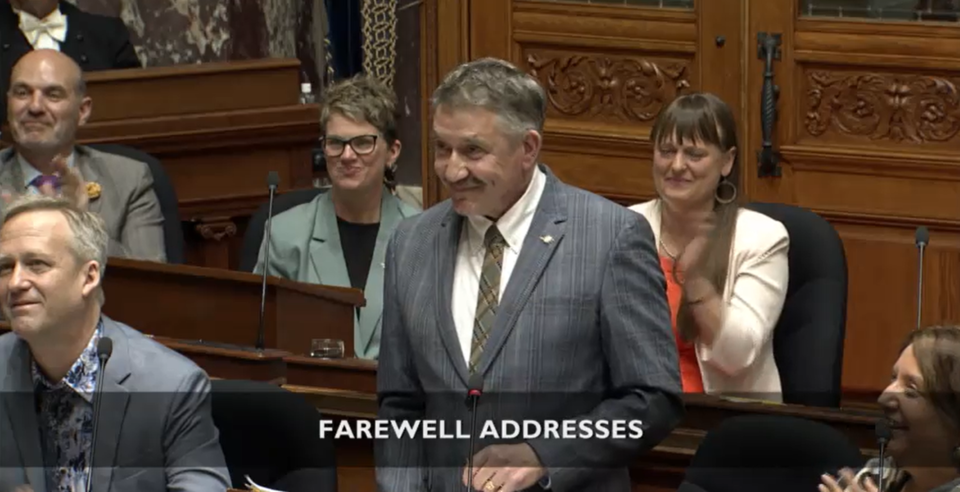There were scant few dry eyes surrounding Powell River-Sunshine Coast MLA Nicholas Simons as he delivered his farewell address at the B.C. Legislature on May 17, with a signature of humour and sadness that outlined two decades with the government. It was the final legislative session before the coming provincial election. After five terms in office, Simons will not return to the ballot this fall.
“I’ve sat in opposition for 12 years, in government, in the back bench and in cabinet,” Simons said. “I’ve chaired committees, travelled the province and met thousands of British Columbians over the years. They’ve all enriched my life.”
Having worked within the child protection sector, Simons shared how provincial matters have always been close to him.
His political career began in 2003 – back then he was director of health and social services for shíshálh Nation. After an event at the Sechelt Legion, Simons spoke with Bill Forst, of the local NDP constituency association, who told him the party was looking for a candidate to run in the next federal election.
Simons fondly recalled asking, “Do I have to join the party?”
While he won the vote on the Sunshine Coast that election, Simons lost the riding. But during that campaign, he met former B.C. Premier Dave Barrett who encouraged Simons to run provincially. So, in 2005, he did.
“It was a tough campaign and all parties were sure they were going to win – turns out I did, with 43 per cent,” said Simons. “The next 12 years I sat in opposition, fighting the good fight against a government that had different priorities from us.”
Ferries were the dominant local issue back then, they had just been privatized, said Simons, and his constituents – residents of the only entirely ferry-reliant constituency in the province – suffered from the rapidly rising fares.
While the community was never without an issue to raise in the legislature, Simons said his priority remained to bring back independent oversight to the child welfare system. It was the focus of his first session after being elected in 2005, and resulted in the Ted Hughes Review, which called for the establishment of an office of the representative for children and youth.
Highlighting his time as Minister of Social Development and Poverty Reduction (2020-2022), Simons pointed to the passing of the 2021 Accessible BC Act that brought in new accessibility standards and work on the provincial poverty reduction strategy. “We made the largest ever increase in income assistance rates and were successful in reducing child poverty and the overall poverty rates,” he said. “And of course, I acknowledge we always have more work to do.”
Speaking to the difficulty in choosing highlights in such an extensive career, Simons said, “There are memorable moments and there are important ones, and they're not always the same.”
He recalled being kicked out of the chamber for refusing to withdraw a remark calling the government “corrupt liars.”
“I think [the speaker] broke the standing orders and let me apologize because it was the last day of session and had I not, I think I would have lost my salary,” Simons said.
“I've attended concerts and festivals and celebrations and funerals and town halls and endless meetings, but I've had the most fun riding my parade bike and the parades,” he reminisced, adding that it always secured him the seven-year-olds’ votes.
Simons recalled wisdom from this father, who told him never to trust anyone without a sense of humour. “He also told me there are times where humour might not be appropriate, but that wasn't a lesson I always applied,” Simons added.
Simons thanked the security staff, dining, gift shop and cleaning staff, saying they were always approachable, and thanked the Seargent-At-Arms crew.
Simons also acknowledged his long-time partner, “the man who's been by my side since before running for office,” Slim Milkie. Remarking that the two have been together for 22 years, Simons said, “He's an artist, musician, philosopher, landscaper, gardener bodyguard, and more popular and famous in my riding than I am.”
Recalling the time he spent working with the shíshálh Nation, Simons said it was an honour to spend time with people like Walter Paul, Maynard Harry, Clint Williams and Hegus John Hackett.
He said that his work with the Nation started with Gary Feschuk and continued under Stan Dixon, Marita Paul, Calvin Craigan, Warren Paul, and most recently lhe hiwus yalxwemult (Chief Lenora Joe).
“If I can be remembered for anything, I don't want it to be a bridge or a highway or a traffic light, I hope people see me as an approachable interested active representative.”
“I hope I've made a few people without a voice find theirs, a few people who are angry a little bit less angry and a few cynics a little bit less cynical. I've never made a promise I couldn't keep but I've always promised that I’d try,” Simons said.
Who comes next?
The next provincial election is scheduled for Oct. 19.
As far as Coast Reporter is aware, there are five nominees for the now vacant NDP candidacy. The successful candidate will be announced immediately after the local NDP’s nomination meeting on June 8.
BC United has nominated Sechelt’s Chris Moore.
BC Green Party and Conservative Party have yet to announce local candidates.
Jordan Copp is the Coast Reporter’s civic and Indigenous affairs reporter. This reporting beat is made possible by the Local Journalism Initiative.



